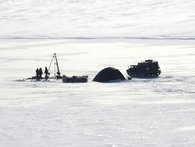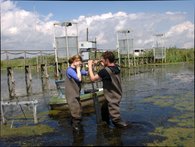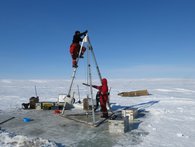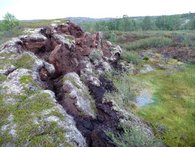Microbial carbon dynamics in the climate system
Background
Microbial communities of the terrestrial surface and subsurface drive the formation and consumption of the greenhouse gases (GHG) CO2 and CH4. They are thus key reagents of climate-induced feedbacks on our Earth surface capable both of accelerating and mitigating Global Change. For projecting how microbes react and adapt to climate change, we seek and characterize microbial sources and sinks of GHG, quantify their process rates, and study their functional and taxonomic response in space and time. We assess microbial controls on near-surface greenhouse gas fluxes and provide a microscope on the microbial carbon turnover in the terrestrial, organic rich subsurface. Our focus is thereby on areas which are highly relevant for the terrestrial carbon cycle such as permafrost regions and peatlands. We apply and establish molecular tools such as high throughput sequencing and metagenomics and combine this with process rate measurements, biogeochemistry, bioinformatics, and multivariate statistics, to uncover and map microorganisms of Earth’s interior. Our data also serve to constrain carbon-pool models.
Scientific key questions
- What are climate-relevant microbial sources and sinks of greenhouse gases at the Earth’s surface and in the subsurface?
- How will these sources and sinks respond to Global Change in terms of microbial community composition, function, abundance and activity?
- What is the timing of these structural and process-related changes and how do they synchronize?
Study sites
- Lena Delta, polygonal tundra and ancient permafrost sediments of Siberia, Russia
- Alaska, thermokarst lake sediments and ancient permafrost, US
- Herschel Island, soils and shallow permafrost deposits, High Canadian Arctic
- Finnmark and Svalbard, arctic and subarctic peatlands, Norway
- Northeastern German lowlands (degraded and rewetted fens of the TERENO-NE observatory), Germany
Projects
- HGF Young Investigators Group MicroCene (VH-NG-919): Microbial Communities of the Terrestrial Subsurface
- BMBF Joint Project KoPF: Carbon in permafrost: Carbon turnover and greenhouse gas release from thawing permafrost landscapes of Northeast Siberia
- EU Innovative Training Network MicroArctic (ITN): Microorganisms in Warming Arctic Environments http://www.microarctic.eu/)
- HGF International Research Group ArcBiont (HIRG0007): Microbial symbionts associated with bryophytes of Arctic peatlands and their relevance for the carbon and nitrogen cycle
Partners
Dr. Christian Knoblauch, Institute of Soil Science, University Hamburg, Germany
Prof. Mette Marianne Svenning, Arctic University of Norway, Norway
Dr. Alexander Tøsdal Tveit, Arctic University of Norway, Norway
Prof. Katey Walter Anthony, University of Fairbanks, Alaska, US
Dr. Paul Overduin, Alfred Wegener Institute, Helmholtz Centre for Polar and Marine Research, Germany
Dr. Jens Strauss, Alfred Wegener Institute, Helmholtz Centre for Polar and Marine Research, Germany
Dr. Joanne Heslop, Queen's University, Canada
Dr. Elizaveta Rivkina, Russian Academy of Sciences, Pushchino, Russia
Prof. Torsten Sachs, German Research Centre for Geosciences (GFZ), Germany
Dr. Gerald Jurasinski, University of Rostock, Germany
Prof. Alex Anesio, University of Bristol, School of Geographical Sciences, UK
Dr. Gary Barker, University of Bristol, UK
Dr. Catherine Larose, Université de Lyon, France
Prof. David Pearce, Northumbria University, UK
Prof. Birgit Sattler, University of Innsbruck, Austria
Dr. Beat Frey, Swiss Federal Institute for Forest, Snow and Landscape Research (WSL), Switzerland
Dr. Carsten Jacobsen, mBioInform, Denmark
Prof. Nina Gunde Cimerman, University of Llubljana, Slovenia
Dr. Cristina Purcarea, University of Bucharest, Romania
Dr. Oddur Vilhelmsson, University of Akureyri, Iceland
Dr. Florian H. H. Brill, Dr. Brill + Partner GmbH, Germany
Prof. Janet Rethemeyer, University of Cologne, Germany
Dr. Tomáš Hájek, University of South Bohemia, Czech Republic
Dr. Kai Mangelsdorf, German Research Centre for Geosciences (GFZ), Germany
Prof. Liane G. Benning, German Research Centre for Geosciences (GFZ), Germany
Priv. Doz. Dr. Judith Schicks, German Research Centre for Geosciences (GFZ), Germany





